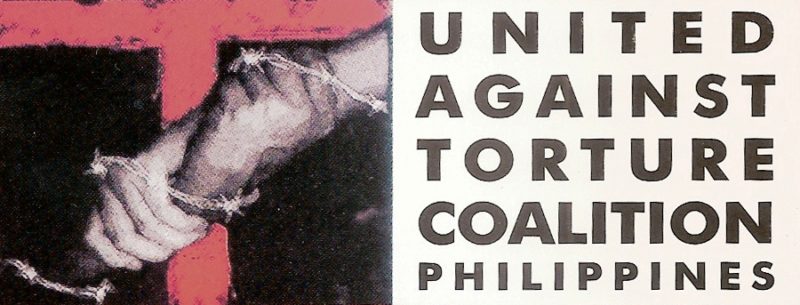PUBLIC STATEMENT
JUNE 5, 2020
ANTI-TERROR LAW WILL MAKE “TORTURE” A NEW NORMAL
We, the United Against Torture Coalition (UATC), the broadest network of civil society organizations and individuals working for the prevention of torture in the Philippines, vehemently condemn the treacherous imminent approval of the new Anti-Terror law that may institutionalize the use of torture and ill treatment in the name of counter-terrorism.
The enactment of the new Anti-Terror Law amid public health emergency due to Covid 19 pandemic shows not only the lack of concern of the Philippine government with the plight of the Filipinos especially the poor who are hardest hit by the Covid 19 pandemic, but also its propensity to suppress political dissent and infringe on fundamental freedoms and human rights including the non-derogable right against torture and ill treatment. The railroading of its passage tramples upon the basic principle of democratic policymaking where all stakeholders are amply heard to ensure that law will serve and protect the governed not the governing.
The enrolled Anti-Terror bill which is just awaiting the President’s signature repeals the Human Security Act of 2007. Several of its provisions breach not only international human rights standards but also basic constitutional safeguards against human rights violations. It allows warrantless arrests and detention from the current maximum of three days to 14 days, extendible for another 10 days. This critical period during which forced confessions may be extracted can put a detainee at great risk of torture and ill-treatment, enforced disappearance, and even summary execution.
Torture is prohibited and penalized under Philippine laws. The Philippines as a State party to the UN Convention against Torture and Other Cruel, Inhuman or Degrading Treatment or Punishment (UNCAT) is under obligation to take a wide array of measures against torture and ill-treatment. These include prohibition in law; prevention; training; prompt, thorough, and impartial investigations; bringing perpetrators to justice; and reparations to victims. The Anti-Torture Act (ATA) or Republic Act No. 9745 was passed in 2009. It makes torture a separate crime and provides for a number of crucial fundamental guarantees to aid in preventing the commission of torture and assists torture survivors in seeking redress.
Despite having a domestic legislation criminalizing the act of torture, this abominable practice continues to be perpetrated with the overwhelming majority of reported cases involving the police. The usual pattern shows that torture takes place following an arrest and when suspects are held incommunicado or kept in unofficial and secret detention facilities. Police officers often resort to torture and other ill-treatment to extract confessions or information from the suspects. In many cases, torture and other ill-treatment are inflicted to punish or to extort money from them. The new Anti-Terror Law will only give the government authorities more room to maneuver and further circumvent other laws to escape accountability especially with the removal of the provision on payment of 500,000 Philippine pesos ($10,000) damages for each day of wrongful detention.
Nothing in the new anti-terror law really guarantees that the authorities will not abuse or misuse the law to exacerbate the prevalence of torture and ill-treatment. Given the Duterte administration’s track record and the well-documented open hostility towards human rights, the law practically allows the current dispensation to do anything it wishes including arbitrarily punishing anyone it dislikes. It can create an environment where the commission of torture becomes a new normal.
The new Anti-Terror law undeniably will create a chilling effect to human rights defenders who are providing assistance to victims of human rights violations who may be accused of committing alleged terrorist acts. The Philippine government can use the law to restrict and even discredit the legitimate work of human rights NGOs, through legal persecution, administrative regulations and public vilification under the guise of fighting terrorism.
While the Philippine government has an obligation to protect its jurisdiction from the threat of terrorism and to ensure its national security, the same should not be at the expense of fulfilling its mandate to promote, protect, and guarantee the exercise and enjoyment of all human rights for all.
Respect for human rights and the rule of law must be the bedrock of the fight against terrorism. The government should take measures to address the conditions that fuel the spread of terrorism, primarily the prevailing social injustice and marginalization, political exclusion and discrimination, irresponsible governance, and the growing violations of human rights.
The Philippine government must learn from the lesson of the Covid 19 pandemic – “cure the disease not the symptoms”.
#NO TO ANTI-TERROR LAW
#TORTURE FREE PHILIPPINES IS THE BEST NORMAL
UNITED AGAINST TORTURE COALITION
AMNESTY INTERNATIONAL-PHILIPPINES * ASIAN FEDERATION AGAINST INVOLUNTARY DISAPPEARANCES * BALAY REHABILITATION CENTER * FAMILIES OF VICTIMS OF INVOLUNTARY DISAPPEARANCE * CHILDREN LEGAL RIGHTS AND DEVELOPMENT * MEDICAL ACTION GROUP * PHILIPPINE ALLIANCE OF HUMAN RIGHTS ADVOCATES * TASK FORCE DETAINESS OF THE PHILIPPINES

